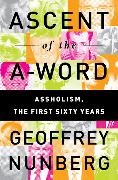Read more
Informationen zum Autor Geoffrey Nunberg! a linguist! is a professor at the UC Berkeley School of Information. Since 1987! he has done a language feature on NPR's"Fresh Air!&rdquo and his commentaries have appeared in the New York Times and many other publications. He is the emeritus chair of the Usage Panel of the American Heritage Dictionary and a winner of the Linguistic Society of America's Language and the Public Interest Award. His previous books include Talking Right and Going Nucular. Nunberg lives in San Francisco. In the tradition of the bestselling On Bullshit, Geoff Nunberg, a professor of linguistics and contributor to NPR's "Fresh Air," tells the story of the inexorable rise in the use of the word "asshole" and shows how it mirrors a decline in public life. Zusammenfassung It first surfaced in the gripes of GIs during World War II and was captured early on by the typewriter of a young Norman Mailer. Within a generation it had become a basic notion of our everyday moral life! replacing older reproaches like lout and heel with a single inclusive category--a staple of country outlaw songs! Neil Simon plays! and Woody Allen movies. Feminists made it their stock rebuke for male insensitivity! the est movement used it for those who didn't"get it!" and Dirty Harry applied it evenhandedly to both his officious superiors and the punks he manhandled. The asshole has become a focus of collective fascination for us! just as the phony was for Holden Caulfield and the cad was for Anthony Trollope. From Donald Trump to Ann Coulter! from Mel Gibson to Anthony Weiner! from the reality TV prima donnas to the internet trolls and flamers! assholism has become the characteristic form of modern incivility! which implicitly expresses our deepest values about class! relationships! authenticity! and fairness. We have conflicting attitudes about the A-word--when a presidential candidate unwittingly uttered it on a live mic in 2000! it confirmed to some that he was a man of the people and to others that he was a boor. But considering how much the word does for us! and to us! it hasn't gotten nearly the attention it deserves--at least until now. ...

